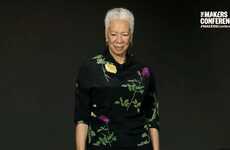
Need Inspiration?
Get inspired by 4,000+ keynote speaker videos & our founder, a top keynote speaker on innovation.
Patrice Gordon Shares Tips on How to Create a Better Workplace
Riley von Niessen — December 1, 2020 — Keynote Trends
References: youtube
In support of employee diversity and inclusive leadership, executive coach and personal development advocate Patrice Gordon delivered a talk on reverse mentorship for TED, as a part of its The Way We Work video series.
In the short video, Gordon goes over six tips on how employers can make reverse mentorship work for them, and explains how this practice can help to create better leaders with a broader understanding of those they interact with on a daily basis. By allowing "the novice to teach the master," Gordon says that workplaces can bridge the gap between different generations of workers and prevent stale thinking, alienation, and blind spots.
In order to make reverse mentorship work, it's important to take a genuine interest in the mentor and find someone who understands their team well. Gordon also stresses the need to ensure mentors are not one's direct report, or even a part of their team—as it's difficult to receive truly honest feedback from someone who will have to be reviewed by the listener. Mentees should also set a clear agenda to go over key elements that they're interested in, and should avoid personal matters or specific feedback that concerns individuals.
By sharing her tips on reverse mentoring, Gordon shows how all workplaces can benefit from these types of confidential conversations, which allow those in different roles to share their thoughts with a company leader, and effectively help them break barriers that tend to exist in environments where a corporate hierarchy is maintained.
In the short video, Gordon goes over six tips on how employers can make reverse mentorship work for them, and explains how this practice can help to create better leaders with a broader understanding of those they interact with on a daily basis. By allowing "the novice to teach the master," Gordon says that workplaces can bridge the gap between different generations of workers and prevent stale thinking, alienation, and blind spots.
In order to make reverse mentorship work, it's important to take a genuine interest in the mentor and find someone who understands their team well. Gordon also stresses the need to ensure mentors are not one's direct report, or even a part of their team—as it's difficult to receive truly honest feedback from someone who will have to be reviewed by the listener. Mentees should also set a clear agenda to go over key elements that they're interested in, and should avoid personal matters or specific feedback that concerns individuals.
By sharing her tips on reverse mentoring, Gordon shows how all workplaces can benefit from these types of confidential conversations, which allow those in different roles to share their thoughts with a company leader, and effectively help them break barriers that tend to exist in environments where a corporate hierarchy is maintained.
2
Score
Popularity
Activity
Freshness
















